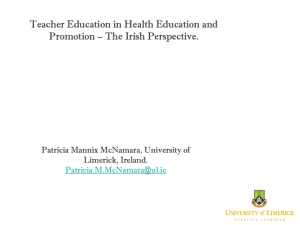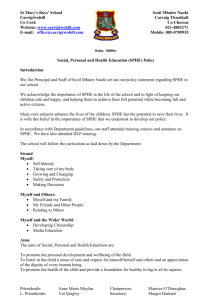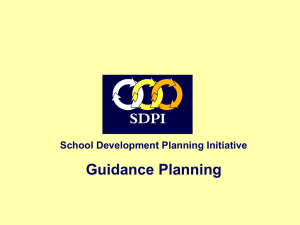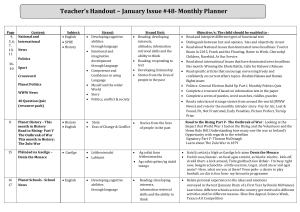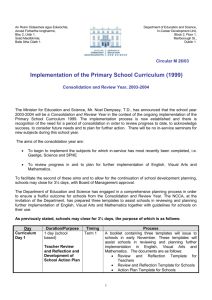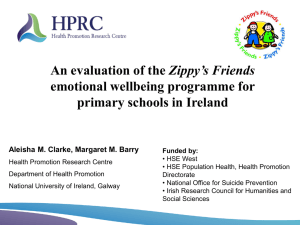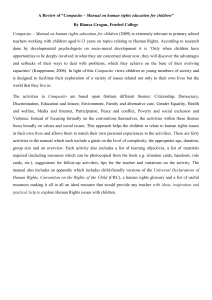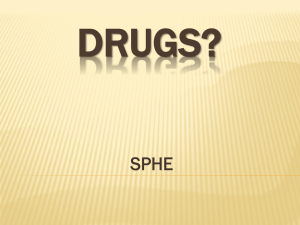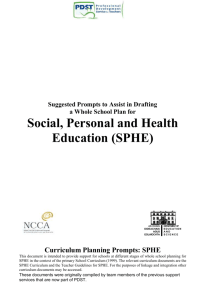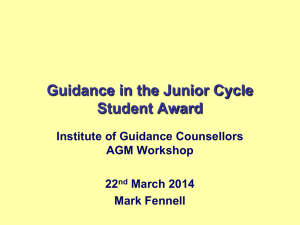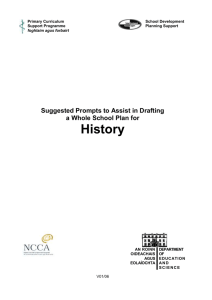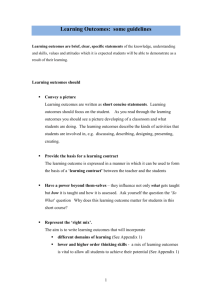Curriculum planning prompt (SPHE)
advertisement
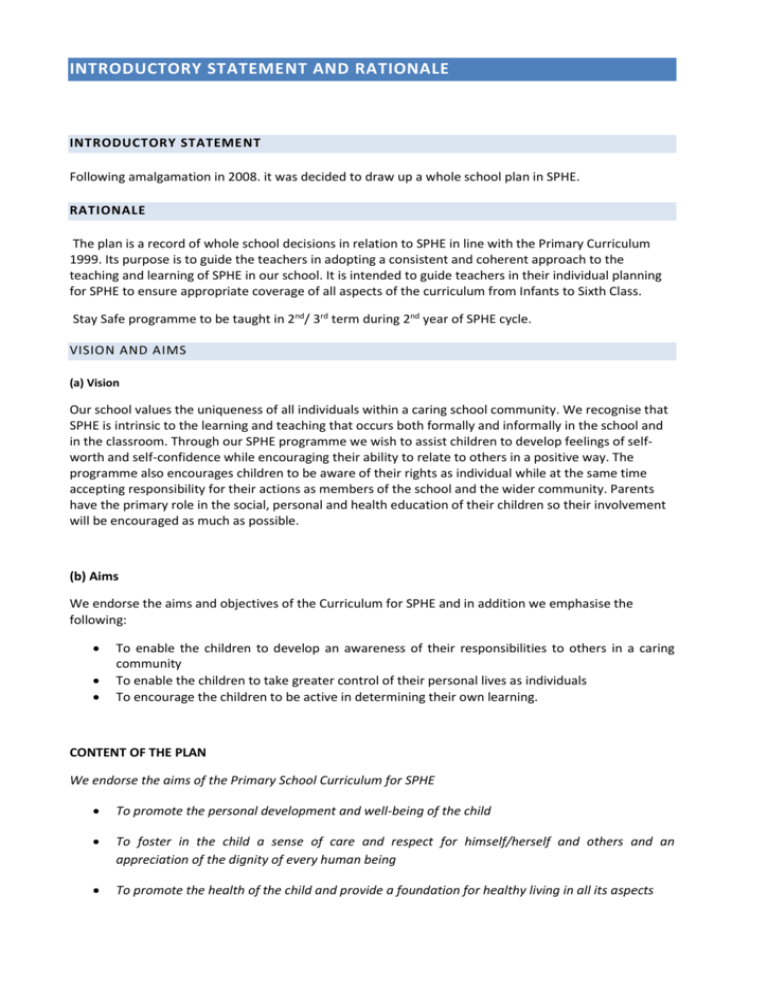
INTRODUCTORY STATEMENT AND RATIONALE INTRODUCTORY STATEMENT Following amalgamation in 2008. it was decided to draw up a whole school plan in SPHE. RATIONALE The plan is a record of whole school decisions in relation to SPHE in line with the Primary Curriculum 1999. Its purpose is to guide the teachers in adopting a consistent and coherent approach to the teaching and learning of SPHE in our school. It is intended to guide teachers in their individual planning for SPHE to ensure appropriate coverage of all aspects of the curriculum from Infants to Sixth Class. Stay Safe programme to be taught in 2nd/ 3rd term during 2nd year of SPHE cycle. VISION AND AIMS (a) Vision Our school values the uniqueness of all individuals within a caring school community. We recognise that SPHE is intrinsic to the learning and teaching that occurs both formally and informally in the school and in the classroom. Through our SPHE programme we wish to assist children to develop feelings of selfworth and self-confidence while encouraging their ability to relate to others in a positive way. The programme also encourages children to be aware of their rights as individual while at the same time accepting responsibility for their actions as members of the school and the wider community. Parents have the primary role in the social, personal and health education of their children so their involvement will be encouraged as much as possible. (b) Aims We endorse the aims and objectives of the Curriculum for SPHE and in addition we emphasise the following: To enable the children to develop an awareness of their responsibilities to others in a caring community To enable the children to take greater control of their personal lives as individuals To encourage the children to be active in determining their own learning. CONTENT OF THE PLAN We endorse the aims of the Primary School Curriculum for SPHE To promote the personal development and well-being of the child To foster in the child a sense of care and respect for himself/herself and others and an appreciation of the dignity of every human being To promote the health of the child and provide a foundation for healthy living in all its aspects To enable the child to make informed decisions and choices about the social, personal and health dimensions of life both now and in the future To develop in the child a sense of social responsibility, a commitment to active and participative citizenship and an appreciation of the democratic way of life To enable the child to respect human and cultural diversity and to appreciate and understand the interdependent nature of the world THIS SPHE PLAN WILL BE ADDRESSED UNDER THE FOLLOWING HEADINGS CURRICULUM PLANNING 1. STRANDS AND STRAND UNITS SPHE is planned in such a way that the child will receive a comprehensive programme in SPHE over a two year period. Teachers are familiar with the content objectives for their class level. The strand units not covered in year one must be included in the teacher’s planning for the following year. In some cases it may be necessary to revise specific objectives from the previous year. Active learning is the principal teaching and learning approach recommended for SPHE. The SPHE programme reflects a spiral approach, where similar aspects are revisited in different ways according to the age, stage of development and readiness of the child. SPHE is intrinsic to the learning and teaching that occurs both formally and informally in the school and in the classroom. 2. CONTEXTS FOR SPHE SPHE will be taught through a combination of contexts Positive school climate and atmosphere Discrete time Integration with other subject areas Positive school climate and atmosphere Teachers are aware of the importance of promoting a positive school climate. Our key messages are: We cater for the individual needs of the children. Individual needs may be social, emotional, spiritual, physical or intellectual. Through assessment, observation and discussion with parents we strive to identify and meet individual needs. We provide opportunities to enhance the self-esteem of all members of the school community. The staff is aware that their role in helping children to develop their self-esteem is to create an environment within the school that is as positive as possible for all concerned. We aim to actively value diversity and to prioritise inclusive and respectful language. We believe that children learn to respect themselves and others through experiencing respect in their own lives and through witnessing respect being shown to others. We work to develop an effective communication system with the school and between school and home. We support a health-promoting physical environment. Emphasis on healthy lunches, healthy lifestyle, road, water, and regular fire drills are some of the areas promoted. Taking responsibility and pride in the school environment is encouraged through our litter prevention programme, our involvement in the Green Schools programme and through constant review and promotion of behaviour habits required for maintaining a clean environment. We promote democratic processes in all levels of school life while balancing roles, rights and responsibilities. Children experience and practice the democratic process by: o o o o o Negotiating the class rules at the start of the year Sharing responsibility Valuing the opinion of others Experiencing a sense of belonging to their own class group and the wider school community Developing a sense of commitment to common goals. Discrete time SPHE may be timetabled for ½ hour per week. One hour per fortnight or blocks of 1 – 2 hours per month where feasible or appropriate. Children who are withdrawn for supplementary teaching must be included for as much of the SPHE programme as possible. The discrete time is used to develop and practise particular skills, deal with sensitive issues or explore issues that are not addressed in other areas of the curriculum. Content objectives dealing with RSE and child protection are addressed through discrete time. Integration At each class level, teachers should seek to integrate SPHE with other curricular areas. Many aspects of SPHE can be dealt with in the context of Religion, English, Gaeilge, SESE, Visual Arts, Drama. 3. APPROACHES AND METHODOLOGIE Teachers know that active learning is the principal learning and teaching approach used in the SPHE programme. The following active learning strategies are promoted for SPHE: Drama activities Co-operative games Pictures, photographs and visual images Discussion: in pairs, small groups, with whole class Written activities: surveys, questionnaires, lists, check-lists, projects, worksheets Media Studies Information and communication technologies Looking at children’s work: portfolios, projects … Other strategies as devised by the class teacher 4. ASSESSMENT CHILDREN’S PROGRESS IN SPHE IS ASSESSED MAINLY THROUGH TEACHER OBSERVATION: The ability of the child to co-operate and work in groups or to work independently The informal interactions between the child and adults and between the child and other children Physical and emotional maturity The quality of presentation of work The participation and interest of the child in a variety of activities. 5. CHILDREN WITH DIFFERENT NEEDS The requirements of children with special needs will be taken into consideration when planning class lessons and related activities. Children who experience bereavement or loss, serious illness or other major personal situations are supported and consideration is given to meeting their individual needs in the most appropriate manner. Reference: Rainbows Programme available to children through liason with Clann Family Resource Centre. Teachers in SN Uachtarard are also trained in this programme. 6. EQUALITY OF PARTICIPATION AND ACCESS We view the SPHE programme as playing a key role in ensuring equality of opportunities for all children. Reference to school’s Equality Policy ORGANISATIONAL PLANNING POLICIES AND PROGRAMMES THAT SUPPORT SPHE We view the SPHE programme as playing a key role in ensuring equality of opportunities for all children. SPHE links with other policies/ programmes used in the school – Substance Use, Stay Safe, As outlined below RSE Policy Child Protection,:: DES guidelines-school office Code of Behaviour,: School Handbook for all parents Anti Bullying:,School Handbook for all parents Health and Safety statement: Healthy Eating, School handbook for all parents & updates on School News Letter Care of the Environment.: Green Schools Programme &SESE Curriculum Teachers are expected to be familiar with these policies and ensure that the schools agreed policy is followed when addressing these issues. 1. RELATIONSHIPS AND SEXUALITY IN EDUCATION AND STAY SAFE PROGRAMME In circular 2/95 issued by the Department of Education and Science, the minister requested all schools to introduce Relationship Sexuality Education (RSE) as part of the curriculum. In the 1999 curriculum, RSE was included in Social Personal and Health Education. RSE is a life long process of acquiring knowledge and understanding and of developing attitudes, beliefs and values about sexual identity, relationships and intimacy. In a school situation RSE, provides structured opportunities for pupils to acquire a knowledge and understanding of human relationships and sexuality through processes, which enable them to form values and to establish behaviours within a moral, spiritual and social framework, appropriate to their age. RSE will be taught in accordance with the Department’s directives and within the Philosophy framework of the school. Teachers will not teach any content outside the Religion programme used by the school or the DES curriculum. The teaching methods used in the school are child centred and reflect the age and stage of development of each child. Sensitive issues will be dealt with appropriately. Aims: In partnership with the home our aims are: To provide opportunities for our pupils to learn about relationships and sexuality, imparted in a loving and caring way, within a wholesome environment To help them think and act in a moral caring and responsible way To learn about their own development and about their friendships and relationships with others. The development of relationships is an integral part of all curriculum subjects. Aspects of RSE are taught during SPHE, Religion, Science, implementation of the Code of Behaviour etc. An integrative approach towards RSE ensures that the children encounter RSE in a holistic manner rather than in isolation. Content: Junior/Senior Infants, First/2nd class Third/4th classes Fifth /sixth classes Dealing with Questions: Teachers do not cover content outside that of the DES curriculum or the school’s religion programme. Topics excluded include contraception, same sex friendships, abortion etc. Answers to questions must be in line with the Catholic Church’s teaching i.e. Sexual intercourse will be discussed within the context of marriage. At the same time teachers should answer questions sensitively aware that there are children in our school from many social backgrounds. No child should be made feel uncomfortable or embarrassed when these issues are raised. Children, who ask questions in class on content outside the curriculum taught, should be talked to individually and discretely, as soon as is possible, by the teacher and encouraged to seek answers from their parents. If a child poses such a question the parents will be informed and asked not to ignore it but to deal with it as they see fit. 2. OVER VIEW OF STAY SAFE PROGRAMME Aim: To teach children personal safety skills so they can look after themselves in situations which could be upsetting or dangerous. Content: The lessons cover the following areas: Feeling Safe and Unsafe Friendship and Bullying Touches Secrets and Telling Strangers Children participating in this programme will learn: To distinguish between safe and unsafe feelings What to do if lost What to do if the phone or doorbell rings when they are alone in the house The importance of friends in children’s lives What to do if bullied Stay Safe Rules: Say No/ Get Away/ Tell Why not to bully others Appreciating normal, appropriate touches That unsafe touches should never be kept secret How to respond to inappropriate touches (Stay Safe Rules) Good and bad secrets That some secrets should not be kept Who and how to tell if in trouble About strangers and safety strategies 3. OVERVIEW OF WALK TALL Junior Infants: Senior Infants: 1st Class 2nd Class 3rd Class 4th Class 5th Class 6th Class Me and Others My Five Senses Belonging and Co-operating Taking Care of My Body Feelings Looking Back, Looking Forward Identity and Self Esteem My Five Senses Belonging Taking Care of My Body Feelings Looking Back I Am Unique People Who Live and Work Together Need Rules I Have Feelings Places Where I Belong Looking Back Changes and Choices My Body I’m Always Learning Looking Back Setting the Scene Valuing Self and Others I Have Feelings My Body In and Out of Balance Choices Looking Back Setting the Scene and Listening Who Am I? Feelings Substances Standing Up for Myself Looking Back Me and Others Feelings Influences Decision Making Alcohol Looking Back Ways of Seeing Feelings Decision Making Smoking Drugs Looking Back Request for withdrawal by parent of pupil or teacher: If parents are concerned about the more sensitive aspects of the RSE or Stay Safe programmes, they are welcome to visit the school to examine the content of the programmes and discuss their concerns with the principal. Following this meeting if parents wish to have their child/ren withdrawn when sensitive issues are being taught, they are requested to submit this in writing to the Principal. Parents will be expected to make their wishes know each year to the new class teacher. Efforts will be made by the school, using the resources it has, to accommodate these children by providing supervision within another classroom. Teachers cannot be held responsible for language used necessarily in school life or by children. A teacher who is concerned about teaching a particular topic within the RSE or Stay Safe programme should talk to the principal about his/her concerns. Such concerns will be handled discreetly. The BOM will endeavour to accommodate such teachers. Resources outside the school profession will be availed of if considered appropriate. Timetable: Teachers will decide the timetabling of Stay Safe lessons and a letter will be sent to parents. 4. CHILD PROTECTION The school follows the DES Child Protection Guidelines and Procedures, which are based on Children First, national Guidelines for the Protection and Welfare of Children. The principal is the designated liaison person (DLP). Each teacher has a copy of our policy on Child Protection and a copy is available to parents, through the secretary, if they request one. 5. RESOURCES A comprehensive selection of resources is available in the staff room for teaching all strand units including Walk Tall, Stay Safe programme, Relationships and Sexuality (DES), (See Teacher Guidelines: SPHE pp.31-33, 102-103;PCSP website – SPHE section for strand units and class levels resource lists; Information and Communications Technology (ICT) in the Primary School Curriculum: Guidelines for Teachers) 5.1 Programmes and other materials 5.2 Guest speakers; Ref, Cathal Kearney. HSE Nutritionist 6. INDIVIDUAL TEACHERS’ PLANNING AND REPORTING; Sphe Manual Yr. 1 & 2 Cuntas Miosiuil. 7. STAFF DEVELOPMENT 8. PARENTAL INVOLVEMENT SPHE IS A SHARED RESPONSIBILITY BETWEEN FAMILY AND SCHOOL. Copies of the school plan for SPHE are available from the office Parents will be made aware of content objectives that deal with ‘sensitive’ issues before teachers cover these in class and will be asked to discuss these issues with their child prior to the lessons in school (Appendix A). 9. COMMUNITY LINKS The school will liaise with the Health Promotion Unit of the Health Board and other agencies to assist, as appropriate, the school’s programme for SPHE. 1. STRANDS AND STRAND UNITS SPHE Curriculum pp. 16 – 66) Active learning is the principal teaching and learning approach recommended for SPHE. The SPHE programme reflects a spiral approach, where similar aspects are revisited in different ways according to the age, stage of development and readiness of the child. SPHE is intrinsic to the learning and teaching that occurs both formally and informally in the school and in the classroom. Strand Unit INFANTS Self Identity Taking Care of My Body Growing and Changing Safety Protection Myself and My Family My Friends and Other People Relating to Others Developing Citizenship TH 6 CLASS Media Education Overview of content for SPHE over two years: Strands Strand Units (Year 1) Strand Units (Year 2) Myself Myself and others Myself and the wider world Implementation (a) Roles and Responsibilities Ms. Margaret Breen will co-ordinate the progress of this plan, encourage and accept feedback on its’ initial implementation. M. Breen will note findings/difficulties on this plan and evaluate need for changes. Any such changes will be discussed and brought forward to Staff meetings as needs arise. (b) Timeframe 2nd/3rd Term 2010: Stay Safe Programme implemented in all classes Academic Term 2010/2011 Year 1 of two year cycle commenced. Review It will be necessary to review this plan on a regular basis to ensure optimum implementation of the SPHE curriculum in the school. (a) Roles and Responsibilities State those involved in the review o o o o o All Teachers will be involved in a review at a designated staff meeting Pupils Parents Post holders/plan co-ordinator - Margaret Breen co-ordinating implementation BoM/DES/Others - Board of Management ratifies policy. It is important that at least one person has responsibility for co-ordinating the review. (b) Timeframe State definite date for the review of this plan. _____________________________________________________________________________________ Ratification and Communication Policy will be ratified by Board of Management Reference Section Curriculum documents for SPHE Primary School Curriculum, Your child’s learning, Guidelines for Parents NCCA Draft Guidelines for Teachers of Students with General Learning Disabilities, 2002 Equal Status Act 2000 Looking at our School, 2003, DES Map of SPHE Resources for Primary Schools, North Eastern Health Board Relationships and Sexuality Education in Catholic Schools, Veritas Relationships and Sexuality Education, A Partnership Between Home and School, DES Guidelines for developing a School Substance Use Policy, DES Walk Tall, Programme for the Prevention of Substance Misuse Bí Folláin, A Programme of Social & Health Education for Primary Schools, Standard Printers Primary School Health Education Programme, Health Education Office, Donegal. Action for Life, Irish Heart Foundation Child Protection Guidelines and Procedures, 2001, DES Children First, National Guidelines for the Protection and Welfare of Children, 1999, Dept. of Health and Children Our Duty to Care, Dept. of Health and Children Stay Safe Programme, Health Promotion Unit, Dept. of Health & Children; CAPP, Cherry Orchard Hospital, Dublin 10 Be Safe - Road Safety, Fire Safety, Water Safety. National Safety Council Stop it! Steps to address bullying, Wexford Education Network Responding to Bullying, First Steps for Teachers, The Cool School Programme. NEHB Investigating and Resolving Bullying in School, Further Steps for Teachers, NEHB INTO Intercultural Guidelines for Schools Trócaire – Development Education resources Bereavement Counselling for Children, Barnardos Video: Childsafe – Be safe on the Farm, Health and Safety Authority, 10 Hogan Place, Dublin 2 Websites: PCSP www.pcsp.ie SDPS www.sdps.ie NCTE www.ncte.ie/internetsafety DES www.education.ie NCCA www.ncca.ie INTO www.into.ie IPPN www.ippn.ie NPC Primary www.npc.ie
